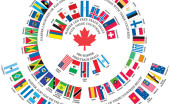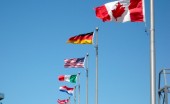Johannah Bernstein post: "eternally proud of my father’s extraordinary aeronautical engineering. legacy. here is a photo of the Canadair Water…
Dion needs to reconnect with party's greatest asset
Written by Diana Thebaud Nicholson // November 15, 2007 // Canada, John Moore, Media, Politics // Comments Off on Dion needs to reconnect with party's greatest asset
Thanks to John Moore for this contribution which accurately reflects the frustrations of a number of Wednesday Nighters – not to mention other members of the grassroots non-establishment.
15 November 2007
David Goutor, Toronto Star Comment
In the discussions of Stéphane Dion’s struggles in Ottawa, one factor has been consistently overlooked: the grassroots of the Liberal party. This neglect is astonishing given that rank-and-file activists constitute by far the Liberal party’s greatest asset, and their desire for a new direction was essential in making Dion the new leader.
It is an old refrain of analysts of popular organizations that the leadership both depends on grassroots members and ignores their wishes. The leaders of social movements and trade unions, whom I study as a historian, have been regularly and at times justifiably attacked for disregarding their memberships. But I am continually amazed by how mainstream political parties get away with being far worse. A prime example is the Liberal party elites’ outright refusal to accept the outcome of last year’s leadership convention.
I have never been a Liberal supporter but I was inspired by the outbreak of internal democracy during that leadership campaign. Rank-and-file Liberals recognized that the party elites were tired and out of touch, and especially saw through the thin veneer of credibility of the supposed heavyweight leadership candidates.
There was Michael Ignatieff, who needed to get reacquainted with the country at the same time that he campaigned to become one of its political leaders. And there was Bob Rae, the former NDP premier who wrote the book on losing catastrophically to hard-line right wingers. If Mike Harris could come from a distant third place to win a majority against Rae, one shudders to think what Stephen Harper could do starting with a minority government.
Understandably, the party’s grassroots sought out different options, and handed surprising momentum to Gerard Kennedy and Dion. The co-operation between these two, and the growing fervour for a fresh approach at the Liberal convention, ended up giving Dion a remarkable triumph. In short, rank-and-file Liberals said loud and clear: “We want serious change.”
But since the convention, the establishment of the party responded loud and clear: “You can’t have it.” The constant carping about Dion from Liberal backrooms is only part of the problem. More fundamental was the expectation of so many power brokers that it was up to Dion to win them over – and not up to them to heed the clear demand from average members for a new style of politics.
It is clear that one of Dion’s biggest problems is that his personality is ill-suited to stroking the egos of the powerful and self-important in the Liberal party. He often appears so audacious as to believe that he should not have to after winning the leadership vote.
The typical response of opinion-makers is that this is precisely why Dion is not prime ministerial material. They contend that the hard reality of politics is that leaders have to get the allegiance of old opponents and silence discontented factions. But these pundits are missing some even more basic political realities, particularly the need to pay attention to opinion polls.
It has been astonishing to watch how often the media, usually so obsessed with the political horse race, have recently treated poll numbers almost as an afterthought. And top Liberals seem intent on ignoring the good news that Harper has made few significant gains in the last year. The Tories continue to alienate key constituencies such as women and major urban centres, and they received no momentum from their mini-budget, thanks in part to the revival of the Mulroney-Airbus affair. Polls also reveal that most voters still have yet to form a strong impression of Dion, even if pollsters are now asking leading questions about replacing him.
An even more basic reality is that lessons from recent general elections are worth remembering. In the 2006 vote, what success the Liberals enjoyed did not start from the top. Paul Martin led a weak and directionless campaign, and his finance minister Ralph Goodale was implicated in a scandal a few weeks before the election. Yet the Liberals retained more than 100 seats due to the party’s strength at the regional, riding and community levels.
It is little wonder that grassroots Liberals are now demoralized after they saved the party from disaster in the last election only to have their message, as expressed at the last convention, ignored in the party’s circles of power.
Dion’s first priority therefore should be to re-establish his connection with the Liberal base, and with the spirit that got him elected leader. He needs to rally his rank and file against their real opponents, the Conservatives, and challenge party elites to do the same. He must shore up his credibility as an opposition leader, and stop rolling over in Parliament and giving the Conservatives virtually free rein to govern.
If this means triggering an election, Dion needs to have faith that mobilizing his party’s proven ground-game and core support in the polls will be enough to guarantee that Harper’s gains will be minor.
Put simply, rather than being relentlessly undermined from within, Dion needs to recognize he is better off giving the Liberal grassroots another chance to demonstrate their strength. While that may not be enough to let Dion win an election, it should deliver a third failure for Harper to get a majority, even in ideal circumstances. And that would give the Conservatives their own leadership problems.
Historian David Goutor is an assistant professor in the labour studies program at McMaster University. He is the author of Guarding the Gates: The Canadian Labour Movement and Immigration, 1872-1934.



